Fleurs du Mal Magazine


Or see the index
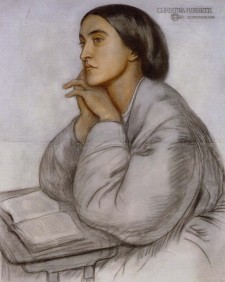
Summer
Winter is cold-hearted
Spring is yea and nay,
Autumn is a weather-cock
Blown every way:
Summer days for me
When every leaf is on its tree;
When Robin’s not a beggar,
And Jenny Wren’s a bride,
And larks hang singing, singing, singing,
Over the wheat-fields wide,
And anchored lilies ride,
And the pendulum spider
Swings from side to side,
And blue-black beetles transact business,
And gnats fly in a host,
And furry caterpillars hasten
That no time be lost,
And moths grow fat and thrive,
And ladybirds arrive.
Before green apples blush,
Before green nuts embrown,
Why, one day in the country
Is worth a month in town;
Is worth a day and a year
Of the dusty, musty, lag-last fashion
That days drone elsewhere.
Christina Georgina Rossetti
(1830 – 1894)
Summer
• fleursdumal.nl magazine
More in: 4SEASONS#Summer, Archive Q-R, Archive Q-R, Rossetti, Christina

Written at Midnight
While thro’ the broken pane the tempest sighs,
And my step falters on the faithless floor,
Shades of departed joys around me rise,
With many a face that smiles on me no more;
With many a voice that thrills of transport gave,
Now silent as the grass that tufts their grave!
Samuel Rogers
(1763 – 1855)
Written at Midnight, 1786
• fleursdumal.nl magazine
More in: # Classic Poetry Archive, Archive Q-R, Archive Q-R

Spring
Frost-locked all the winter,
Seeds, and roots, and stones of fruits,
What shall make their sap ascend
That they may put forth shoots?
Tips of tender green,
Leaf, or blade, or sheath;
Telling of the hidden life
That breaks forth underneath,
Life nursed in its grave by Death.
Blows the thaw-wind pleasantly,
Drips the soaking rain,
By fits looks down the waking sun:
Young grass springs on the plain;
Young leaves clothe early hedgerow trees;
Seeds, and roots, and stones of fruits,
Swollen with sap put forth their shoots;
Curled-headed ferns sprout in the lane;
Birds sing and pair again.
There is no time like Spring,
When life’s alive in everything,
Before new nestlings sing,
Before cleft swallows speed their journey back
Along the trackless track–
God guides their wing,
He spreads their table that they nothing lack,–
Before the daisy grows a common flower,
Before the sun has power
To scorch the world up in his noontide hour.
There is no time like Spring,
Like Spring that passes by;
There is no life like Spring-life born to die,–
Piercing the sod,
Clothing the uncouth clod,
Hatched in the nest,
Fledged on the windy bough,
Strong on the wing:
There is no time like Spring that passes by,
Now newly born, and now
Hastening to die.
Christina Georgina Rossetti
(1830 – 1894)
Spring
• fleursdumal.nl magazine
More in: 4SEASONS#Spring, Archive Q-R, Archive Q-R, Rossetti, Christina
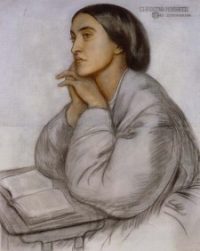
A Wintry Sonnet
A robin said: The Spring will never come,
And I shall never care to build again.
A Rosebush said: These frosts are wearisome,
My sap will never stir for sun or rain.
The half Moon said: These nights are fogged and slow,
I neither care to wax nor care to wane.
The Ocean said: I thirst from long ago,
Because earth’s rivers cannot fill the main.
When springtime came, red Robin built a nest,
And trilled a lover’s song in sheer delight.
Gray hoarfrost vanished, and the Rose with might
Clothed her in leaves and buds of crimson core.
The dim Moon brightened. Ocean sunned his crest,
Dimpled his blue, – yet thirsted evermore.
Christina Georgina Rossetti
(1830 – 1894)
A Wintry Sonnet
• fleursdumal.nl magazine
More in: 4SEASONS#Winter, Archive Q-R, Archive Q-R, Rossetti, Christina

Winter: My Secret
I tell my secret? No indeed, not I:
Perhaps some day, who knows?
But not to-day; it froze, and blows, and snows,
And you’re too curious: fie!
You want to hear it? well:
Only, my secret’s mine, and I won’t tell.
Or, after all, perhaps there’s none:
Suppose there is no secret after all,
But only just my fun.
To-day’s a nipping day, a biting day;
In which one wants a shawl,
A veil, a cloak, and other wraps:
I cannot ope to every one who taps,
And let the draughts come whistling through my hall;
Come bounding and surrounding me,
Come buffeting, astounding me,
Nipping and clipping through my wraps and all.
I wear my mask for warmth: who ever shows
His nose to Russian snows
To be pecked at by every wind that blows?
You would not peck? I thank you for good-will,
Believe, but leave that truth untested still.
Spring’s an expansive time: yet I don’t trust
March with its peck of dust,
Nor April with its rainbow-crowned brief showers,
Nor even May, whose flowers
One frost may wither through the sunless hours.
Perhaps some languid summer day,
When drowsy birds sing less and less,
And golden fruit is ripening to excess,
If there’s not too much sun nor too much cloud,
And the warm wind is neither still nor loud,
Perhaps my secret I may say,
Or you may guess.
Christina Georgina Rossetti
(1830 – 1894)
Winter: My Secret
• fleursdumal.nl magazine
More in: 4SEASONS#Winter, Archive Q-R, Archive Q-R, Rossetti, Christina
A story of sibling love ruptured by the Iron Curtain, by one of the most significant East German writers.
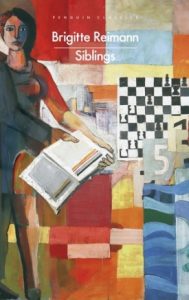
“I will never forgive you,” Uli says to his sister Elisabeth.
Disillusioned by life in the East, Uli also dreams of escape, while Elisabeth still holds out hope for the political project of the GDR. With physical checkpoints and ideological tensions between them, the siblings must navigate emotional rifts as they enter into a drama fueled by love in this unflinching portrayal of life in the early years of the German Democratic Republic.
One of the most significant East German writers, Brigitte Reimann (1933–1973) wrote irreverent, autobiographical works that addressed issues and sensibilities otherwise repressed in the GDR. Outspoken and idealistic, she wrote in her diaries that she would rather “live 30 wild years instead of 70 well-behaved ones.”
Considered a master of socialist realism, she heeded the state’s call for artists to engage with the people, teaching writing classes for industrial plant workers. Of her generation’s suffering, she wrote to her brother, “We marched forth carrying such a heavy baggage of ideals.”
After her death from cancer in 1973, at age 39, Reimann garnered cult-like attention. This is her first work of fiction to appear in English.
Siblings
by Brigitte Reimann
translated by Lucy Jones
Publisher: Penguin Classics
1st edition 2 Feb. 2023
Language: English
Paperback
144 pages
ISBN-10: 0241555833
ISBN-13: 978-0241555835
£12.99
• fleursdumal.nl magazine
More in: - Book News, - Bookstores, Archive Q-R, REPRESSION OF WRITERS, JOURNALISTS & ARTISTS, TRANSLATION ARCHIVE
A poetic evaluation of what it means to grow up a girl, and how this intersects with disability/visual impairment.
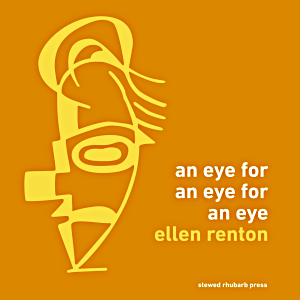 An Eye For An Eye For An Eye explores what it means to grow up a girl, and how this experience intersects with disability and visual impairment.
An Eye For An Eye For An Eye explores what it means to grow up a girl, and how this experience intersects with disability and visual impairment.
These poems concern themselves with looking: looking back over a childhood, looking again at what’s in front of us, and looking forward to possible futures. They visit girlhood and myth, blindness and friendship. They celebrate the freedom, shame, and awkwardness of coming to terms with our own bodies, and they ask what it means to look different and see differently.
Ellen Renton is a poet, performer, and theatre maker from Edinburgh whose writing has been published in a number of literary magazines. She she has performed at venues and festivals around the UK, is a co-founder of In The Works spoken word theatre company, and is the creator of the one woman poetry show Within Sight.
(…) They say, you are so brave and persistent.
You say thank you and ask for help.
They say, what do you think of this cosy lining?
You ask for help.
They say, I admire you, so brave and so persistent.
(fragment poem Ellen Renton)
An Eye For An Eye For An Eye
by Ellen Renton
Pamphlet For Stewed Rhubarb Press,
2021
£5.99
• fleursdumal.nl magazine
More in: #Editors Choice Archiv, - Book News, - Bookstores, Archive Q-R, Archive Q-R

The Everlasting Return
It is dark… so dark, I remember the sun on Chios…
It is still… so still, I hear the beat of our paddles on the Aegean…
Ten times we had watched the moon
Rise like a thin white virgin out of the waters
And round into a full maternity…
For thrice ten moons we had touched no flesh
Save the man flesh on either hand
That was black and bitter and salt and scaled by the sea.
The Athenian boy sat on my left…
His hair was yellow as corn steeped in wine…
And on my right was Phildar the Carthaginian,
Grinning Phildar
With his mouth pulled taut as by reins from his black gapped teeth.
Many a whip had coiled about him
And his shoulders were rutted deep as wet ground under chariot wheels,
And his skin was red and tough as a bull’s hide cured in the sun.
He did not sing like the other slaves,
But when a big wind came up he screamed with it.
And always he looked out to sea,
Save when he tore at his fish ends
Or spat across me at the Greek boy, whose mouth was red and apart like an opened fruit.
We had rowed from dawn and the green galley hard at our stern.
She was green and squat and skulked close to the sea.
All day the tish of their paddles had tickled our ears,
And when night came on
And little naked stars dabbled in the water
And half the crouching moon
Slid over the silver belly of the sea thick-scaled with light,
We heard them singing at their oars…
We who had no breath for song.
There was no sound in our boat
Save the clingle of wrist chains
And the sobbing of the young Greek.
I cursed him that his hair blew in my mouth, tasting salt of the sea…
I cursed him that his oar kept ill time…
When he looked at me I cursed him again,
That his eyes were soft as a woman’s.
How long… since their last shell gouged our batteries?
How long… since we rose at aim with a sleuth moon astern?
(It was the damned green moon that nosed us out…
The moon that flushed our periscope till it shone like a silver flame…)
They loosed each man’s right hand
As the galley spent on our decks…
And amazed and bloodied we reared half up
And fought askew with the left hand shackled…
But a zigzag fire leapt in our sockets
And knotted our thews like string…
Our thews grown stiff as a crooked spine that would not straighten…
How long… since our gauges fell
And the sea shoved us under?
It is dark… so dark…
Darkness presses hairy-hot
Where three make crowded company…
And the rank steel smells….
It is still… so still…
I seem to hear the wind
On the dimpled face of the water fathoms above…
It was still… so still… we three that were left alive
Stared in each other’s faces…
But three make bitter company at one man’s bread…
And our hate grew sharp and bright as the moon’s edge in the water.
One grinned with his mouth awry from the long gapped teeth…
And one shivered and whined like a gull as the waves pawed us over…
But one struck with his hate in his hand…
After that I remember
Only the dead men’s oars that flapped in the sea…
The dead men’s oars that rattled and clicked like idiots’ tongues.
It is still… so still, with the jargon of engines quiet.
We three awaiting the crunch of the sea
Reach our hands in the dark and touch each other’s faces…
We three sheathing hate in our hearts…
But when hate shall have made its circuit,
Our bones will be loving company
Here in the sea’s den…
And one whimpers and cries on his God
And one sits sullenly
But both draw away from me…
For I am the pyre their memories burn on…
Like black flames leaping
Our fiery gestures light the walled-in darkness of the sea…
The sea that kneels above us…
And makes no sign.
Lola Ridge
(1873-1941)
The Everlasting Return
• fleursdumal.nl magazine
More in: Archive Q-R, Archive Q-R, Ridge, Lola
The hidden history of a vulnerable gay man whose life and death were turned into tabloid fodder.
In the early 1990s, eight people living in a small conservative Florida town alleged that Dr. David Acer, their dentist, infected them with HIV. David’s gayness, along with his sickly appearance from his own AIDS-related illness, made him the perfect scapegoat and victim of mob mentality.
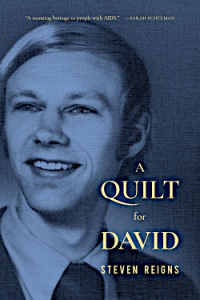 In these early years of the AIDS epidemic, when transmission was little understood, and homophobia rampant, people like David were villainized. Accuser Kimberly Bergalis landed a People magazine cover story, while others went on talk shows and made front page news.
In these early years of the AIDS epidemic, when transmission was little understood, and homophobia rampant, people like David were villainized. Accuser Kimberly Bergalis landed a People magazine cover story, while others went on talk shows and made front page news.
With a poet’s eulogistic and psychological intensity, Steven Reigns recovers the life and death of this man who also stands in for so many lives destroyed not only by HIV, but a diseased society that used stigma against the most vulnerable.
It’s impossible not to make connections between this story and how the twenty-first century pandemic has also been defined by medical misinformation and cultural bias.
Inspired by years of investigative research into the lives of David and those who denounced him, Reigns has stitched together a hauntingly poetic narrative that retraces an American history, questioning the fervor of his accusers, and recuperating a gay life previously shrouded in secrecy and shame.
Steven Reigns is a Los Angeles-based poet and educator and was appointed the first Poet Laureate of West Hollywood. Alongside over a dozen chapbooks, he has published the collections Inheritance and Your Dead Body is My Welcome Mat. Reigns holds a BA in Creative Writing from the University of South Florida, a Master of Clinical Psychology from Antioch University, and is a fourteen-time recipient of The Los Angeles County’s Department of Cultural Affairs’ Artist in Residency Grant. He edited My Life is Poetry, showcasing his students’ work from the first-ever autobiographical poetry workshop for LGBT seniors. Reigns has lectured and taught writing workshops around the country to LGBT youth and people living with HIV. Currently he is touring The Gay Rub, an exhibition of rubbings from LGBT landmarks, facilitates the monthly Lambda Lit Book Club, and is at work on a new collection of poetry.
A Quilt for David Paperback
by Steven Reigns (Author)
2021
Language: English
Publisher: City Lights Publishers
Paperback
128 pages
ISBN-10: 0872868818
ISBN-13: 978-0872868816
$11.12
• fleursdumal.nl magazine
More in: #Editors Choice Archiv, - Book News, - Bookstores, AIDS, Archive Q-R, Archive Q-R, LGBT+ (lhbt+)

Lied des Todes
Alles Leben ist Lüge,
Wahr bin nur ich allein,
Finde nun, Herz, Dein Genüge,
Schlafe, schlafe nun ein.
Ich war Dein erster Begleiter
Und werde Dein letzter sein,
Die Menschen eilten weiter,
Ich liess dich nie allein.
Sie alle kränkten dich stets aufs neu,
Ich stand nur still beiseite,
Sie gingen alle, ich blieb treu,
Ergib Dich mir nun heute.
Lieb mich und meine sanfte Macht,
Du bist mir ja bestimmt.
Das Leben hat dich müd gemacht,
Schlaf ein, schlaf ein, mein Kind.
Ich und Deine Mutter lauschten
Deines Herzens erstem Schlag,
Blut und Blut zusammenrauschten,
Herz an Herz gebettet lag.
Sie war Anfang, ich bin Ende
Und dazwischen littest Du.
Gib Dich nun in meine Hände,
Finde, Seele, Deine Ruh.
Joseph Roth
(1894 – 1939)
Lied des Todes
• fleursdumal.nl magazine
More in: Archive Q-R, Archive Q-R, Joseph Roth
major exhibition devoted to
the radical Rossetti generation
in Tate Britain
from 6 April until 24 September 2023
This exhibition follows the romance and radicalism of the Rossetti generation, through and beyond the Pre-Raphaelite years: Dante Gabriel, Christina and Elizabeth (née Siddal). Visitors will get to experience world-renowned works from their boundary-pushing careers.
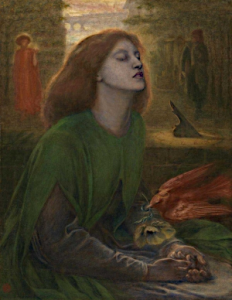 The Rossettis’ approach to art, love and lifestyles are considered revolutionary, and this will be thoroughly explored in an immersive show, using spoken poetry, drawings, paintings, photography, design and more.
The Rossettis’ approach to art, love and lifestyles are considered revolutionary, and this will be thoroughly explored in an immersive show, using spoken poetry, drawings, paintings, photography, design and more.
This is the first retrospective of Dante Gabriel Rossetti at Tate and the largest exhibition of his iconic pictures in two decades.
It will also be the most comprehensive exhibition of Elizabeth Siddal’s work for 30 years, featuring rare surviving watercolours and important drawings.
The Rossettis will take a fresh look at the fascinating myths surrounding the unconventional relationships between Dante Gabriel Rossetti, Elizabeth Siddal, Fanny Cornforth and Jane Morris.
The Rossettis exhibition book
by Carol Jacobi and James Finch
hardback
Dimensions 27.5 x 23 cm
Material FSC certified paper and card
ISBN 9781849768412
£40
This visually captivating hardback exhibition book is devoted to the radical Rossetti generation.
Explore the Rossettis’ revolutionary approach to art, love and lifestyles through a collection of thematic essays containing fresh and surprising research, accompanied by beautiful Pre-Raphaelite illustrations.
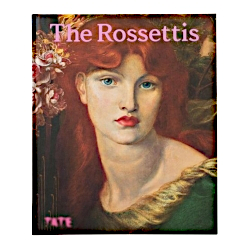 The Rossettis takes a fresh look at the fascinating myths surrounding the unconventional relationships between Dante Gabriel Rossetti, Elizabeth Siddal, Fanny Cornforth and Jane Morris. Featuring artworks and writings by Dante Gabriel, Christina and Elizabeth (née Siddal), the book distinguishes the Rossettis and foregrounds their countercultural roles.
The Rossettis takes a fresh look at the fascinating myths surrounding the unconventional relationships between Dante Gabriel Rossetti, Elizabeth Siddal, Fanny Cornforth and Jane Morris. Featuring artworks and writings by Dante Gabriel, Christina and Elizabeth (née Siddal), the book distinguishes the Rossettis and foregrounds their countercultural roles.
The catalogue accompanies the first retrospective of Dante Gabriel Rossetti at Tate and the largest exhibition of his iconic pictures in two decades, and what will also be the most comprehensive exhibition of Elizabeth Siddal’s work for 30 years, featuring rare surviving watercolours and important drawings.
The publication is edited by Carol Jacobi, Curator, British Art 1850—1915 at Tate and James Finch, Assistant Curator, Nineteenth Century Art at Tate. It features contributions by:
– Chiedza Mhondoro, Assistant Curator, Historic British Art at Tate – Dinah Roe, Reader in Nineteenth Century Literature at Oxford Brookes University – Glenda Youde, a writer and researcher based at University of York – Liz Prettejohn, Professor of Art History at University of York – Jan Marsh, a writer, curator and specialist in the Pre-Raphaelite period – Gursimran Oberoi, an associate teaching fellow at University of Surrey – Margaretta S. Frederick, the former Annette Woolard-Provine Curator of the Bancroft Collection of Pre-Raphaelite Art at Delaware Art Museum – Wendy Parkins, Professor of Victorian Literature and the Director of the Centre for Victorian Literature and Culture at the University of Kent
• fleursdumal.nl magazine
More in: *The Pre-Raphaelites Archive, - Book News, - Bookstores, Archive Q-R, Archive Q-R, Art & Literature News, Exhibition Archive, FDM in London, History of Britain, Illustrators, Illustration, Morris, William, Rossetti, Christina, Rossetti, Dante Gabriel, Siddal, Lizzy

Tod im Frühling
Ein Professor, fromm und tugendhaft,
war exorbitant normal im Winter;
zur Erhaltung deutscher Manneskraft
schlief er stets mit einem Werk von Dinter;
morgens steckte er ins Stahlbad Glied um Glied,
trieb am Reck dann Weltkriegsvorbereitung,
und, fürs arisch-reine Vaterland erglüht,
abonnierte er die »Deutsche Zeitung«.
Also lebte er zur Winterszeit. –
Doch beim ersten Lied der Nachtigallen
machte er sein Teleskop bereit,
um des Nachts durch das Gebüsch zu wallen;
Minne glühte auch in seiner Brust,
wenn er eine Wade wo erblickte;
und es war sein Wille groß wie seine Lust – –
nur, daß letztere ihm niemals glückte.
Mit der Blendlaterne spähte er
nach den unverschämten Gartenbänken,
zu den deutschen Göttern flehte er,
dieses Mobiliar der Juden zu versenken;
aber Unzucht blieb, kein Rächer kam,
und vergebens betete der Keusche,
während er, moral-geplagt, vernahm
außereheliche Nachtgeräusche.
Bald begannen Nase, Aug’ und Ohr
und der sechste Sinn sich auch zu schämen – –
außer sich geriet der Professor,
und er mußte endlich Anstoß nehmen;
unter einem weißen Fliederstrauch
tat er’s, ward erregt – und fand sein Ende . . .
Streng und sittlich flog sein letzter Hauch
wie ein keuscher Fluch durch das Gelände . . .
Joseph Roth
(1894 – 1939)
Tod im Frühling
Lachen links – 9. 5· 1924
• fleursdumal.nl magazine
More in: Archive Q-R, Archive Q-R, Joseph Roth, Natural history
Thank you for reading Fleurs du Mal - magazine for art & literature